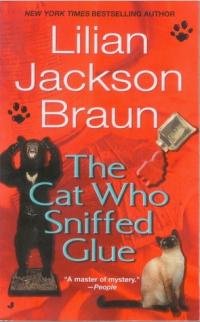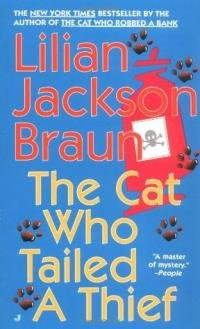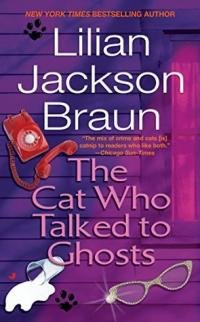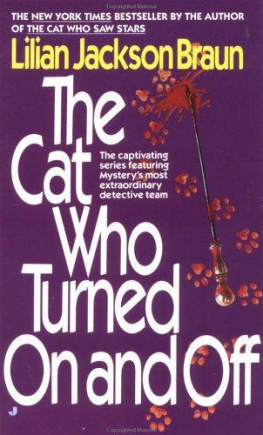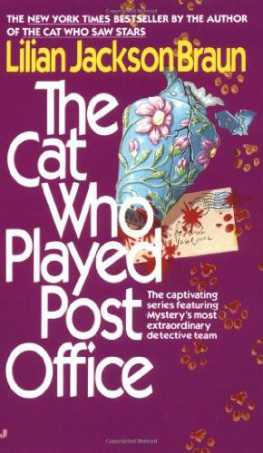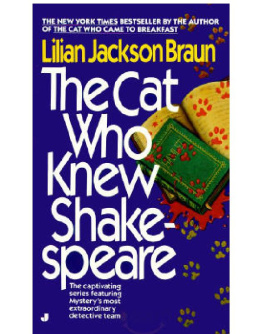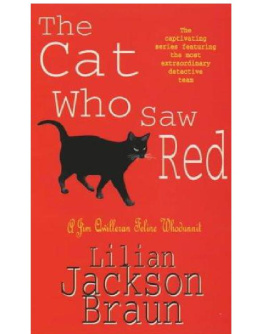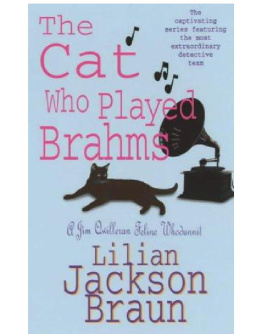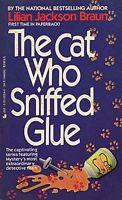Lilian Jackson Braun - The Cat Who Sniffed Glue
THE TELEPHONE RANG at an early hour, and Qwilleran reached blindly toward his bedside table. Half awake, he croaked a hoarse hello and heard an authoritative voice saying, "I want to talk to you!"
The voice was familiar, but the tone was alarming. It was Andrew Brodie, the chief of police in Pickax, and he sounded stem and accusing.
Qwilleran was always groggy before his first cup of coffee, and his mind groped for an explanation. Had he put a Canadian nickel in a parking meter? Tossed an apple core from his car window? Honked the horn within 500 feet of the hospital?
"Did you hear me? I want to talk to you!" The tone was not so gruff as before.
Qwilleran was getting his bearings, and he recognized the bantering style that passed for sociability among adult males in Moose County. "Okay, Brodie," he said. "Do I go to the station and give myself up? Or do you want to send the wagon and handcuffs?"
"Stay where you are. I'll be right there," said the chief. "It's about your cat." He hung up abruptly.
Again the possibilities churned in Qwilleran's mind. Had the Siamese been disturbing the peace? They were strictly indoor pets, but the male had a high-decibel yowl and the female had a shriek that could be duplicated only by a synthesizer. Either of them could be heard for blocks on a calm day if the windows were open. It was late May, and the windows were open to admit the sweet refreshing breezes for which Moose County was famous - sweet and refreshing except when they came from the direction of the Kilcally dairy farm.
Hurriedly Qwilleran pulled on some clothes, ran a wet comb through his hair, collected the newspapers cluttering the living room floor, slammed the bedroom door on his unmade bed, and looked out the window in time to see Brodie's police car pulling into the driveway.
Qwilleran lived in an apartment over a four-car garage, formerly the carriage house for the Klingenschoen estate. The carriage house was situated far back on the property; the mansion itself fronted on Main Street facing the park - a huge, square stone building now being remodeled as a theater for stage productions. Its broad lawns had been brutally torn up to accommodate trucks, piles of lumber, and a temporary construction shed. As the police car maneuvered around these obstacles, carpenters and electricians swarming over the site waved friendly salutes in the chief's direction. Brodie was a popular lawman, an amiable Scot with a towering figure, a beefy chest, and sturdy legs that looked appropriate with the kilt, tam-o'-shanter, and bagpipe that he brough out for parades and weddings.
As Brodie climbed the stairs to the apartment, Qwilleran greeted him from the top of the flight.
The chief was grumbling. He was always complaining about something. "They made the stairs too steep and too small when this place was built. There isn't room for a healthy man's foot."
"Walk up sideways," Qwilleran suggested. "What's that thing?" Brodie pointed to a circle of ornamental wrought iron, a yard in diameter, leaning against the wall at the head of the stairs. Centered in the design were three cats rampant - scrappy animals - rearing on hind legs, ready to attack.
"That's from the gate of a three hundred-year-old Scottish castle." Qwilleran spoke with pride. "It's adapted from the Mackintosh coat of arms. My mother was a Mackintosh."
"Where'd you get it?" Brodie's envious manner indicated he would give anything for a similar memento of his own clan - or anything within reason; he was a thrifty man.
"From an antique shop Down Below. I left it in the city when I moved up to Pickax. Had it shipped up here last week."
"Looks heavy. Must've cost plenty for freight."
"It weighs about a hundred pounds. I'd like to incorporate it in my living room, but I don't know how."
"Ask my daughter. She has a lot of far-out ideas."
"Is that a commercial?" Qwilleran asked. Francesca Brodie was an interior designer.
With a bagpiper's swagger Brodie walked into the living room, giving it a policeman's quick once-over before flopping into a man-sized lounge chair. "You've got a comfortable roost here."
"Francesca's been helping me fix it up. When I lived in the mansion up front, this was an escape from too much opulence, but when I started living here full-time it suddenly looked bleak. How do you like what she put on the walls? Hand-woven Scottish tweed."
The chief turned to appraise the oatmeal-colored, oatmeal-textured wallcovering. "You shelled out plenty for that stuff, I bet. But I guess you can afford It." He then stared at the end wall. "You've got a lot of shelves."
"Francesca designed the shelf setup and had her carpenter build it. I'm starting to collect old books."
"With your bankroll you ought to be buying new books."
"I like old books. I bought a whole set of Dickens for ten bucks. You're a thrifty Scot; you should appreciate that."
"What's that picture?" Brodie pointed to a framed print over the sofa.
"An 1805 gunboat that used to sail the Great Lakes... "How about a free cup of coffee?" Qwilleran stirred heaping spoonfuls of instant coffee into boiling water and handed a mug to Brodie. "Okay, what's the bad news, chief? What's so urgent that you have to get me out of bed?"
"Just got back from a law-enforcement conference Down Below," Brodie said. "Glad to be back where life is civilized. I tell you, those cities down there are jungles. They stole the mayor's car the first day of the conference."
He took a swallow of coffee and choked. "Och! This is rugged stuff!"
"What was the conference about?"
"Drug-related violence. One of the speakers was a friend of yours. Lieutenant Hames. I talked to him at lunch."
"Hames is a brilliant detective, although he likes play to dumb."
"He told me some things about you, too. He said you gave him some good tips when you were writing for the Daily Fluxion."
Qwilleran smoothed his moustache modestly. "Well, you know how it is. Things happen on a newspaper beat. I kept my eyes peeled and my ears flapping, that's all."
"Hames told me something else, too, and I thought he was putting me on, but he swears it's true. He says you have a very unusual cat. Very smart animal."
"He's right about that. Siamese are remarkably intelligent."
Brodie eyed his host keenly. "He says your cat is, like they say... psychic!
"Wait a minute now. I wouldn't go that far, Brodie."
"He said your cat led the police to evidence that solved a couple of cases."
Qwilleran cleared his throat as he did before making a formal declamation. "You're a dog man, Brodie, so maybe you don't know this, but cats are the detectives of the animal world. They're naturally inquisitive. They're always sniffing around, scratching here and there, finding small places to sneak into, digging things out of holes. If my cat unearthed any clues, it was purely accidental."
"What's its name? I'd like to have a look at this cat."
"Koko is a seal-point Siamese, a neutered male, highly pedigreed. And don't call him 'it' or he'll put the whammy on you."
An imperious demand sounded from somewhere down the hall.
"That's Koko," Qwilleran said. "He heard his name mentioned, and he hasn't had his breakfast yet. I'll let him out. The cats have their own apartment."
"They do? I'll be damned!"
"With private bath and television."
"Television! You've gotta be kidding."
"Just a small black-and-white set. Cats don't see colors."
Enjoying Brodie's shock, Qwilleran excused himself and walked down the hall. The fonner servants' quarters over the garage provided him with a living room, writing studio, and bedroom. The fourth room - the one with the sunniest exposure - was reserved for the Siamese. It was furnished with soft carpet, cushions, baskets, scratching posts, and wide window sills facing south and west. In the bathroom were two commodes - his and hers. Originally they shared the same litter pan, but the female had developed a temperamental behavior pattern in recent weeks; she wanted her own facilities.
Next page
